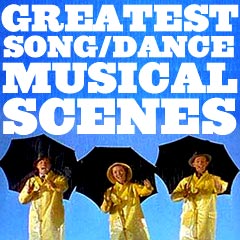
|
|
| L | |||||

|
Lady and the Tramp (1955) Disney's first Cinemascope animated feature starred two anthropomorphic creatures - pampered female cocker spaniel Lady and wrong-side-of-the-tracks mutt Tramp. All of the songs were written (with Sonny Burke) and mostly sung by Peggy Lee, including:
|
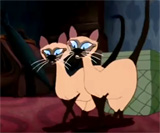 Aunt Sarah's Two Cats: "The Siamese Cat Song" 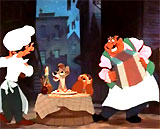 Lady and Tramp Served and Serenaded by "Bella Notte" at Tony's Restaurant 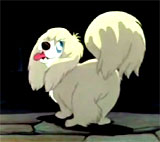 Sultry Pekingese Peg (Singing "He's a Tramp") |
|||
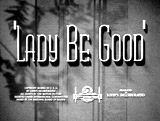
|
Lady Be Good (1941)
The MGM Norman McLeod-directed musical was titled after the film's theme song, Lady Be Good, derived from the name of the 1924 Broadway hit musical ("Oh! Lady Be Good") with music by George and Ira Gershwin. There were a total of nine nominees for Best Original Song this year, and ultimately, the year's Oscar-winner (the film's sole nomination) had not been specifically written for the film in which it appeared. It had been published and recorded in 1940 before the film was released. [Note: AMPAS changed the rules after 1941 - only songs that were "original and written specifically for the motion picture" were eligible to win.] The plot of the romantic musical drama centered around two married songwriters with an on-again/off-again relationship:
There were a number of memorable dances and performances:
|
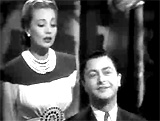 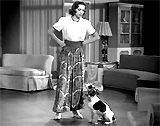 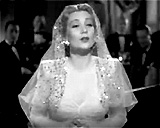 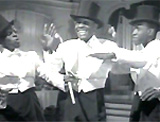 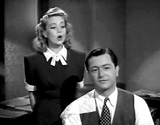 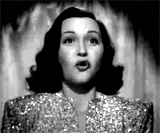 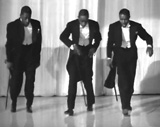  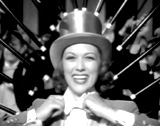
|
|||

|
The Last Waltz (1978) Director Martin Scorsese's documentary of the final performance of The Band in 1976 (at the Winterland Ballroom in San Francisco) has generally been considered one of the greatest rock concert films ever made. It featured the music of the legendary The Band (The Weight, The Night They Drove Old Dixie Down, Up on Cripple Creek, and Old Time Religion), and performances by Eric Clapton, Neil Diamond, Bob Dylan (Baby Let Me Follow You Down), Joni Mitchell, Van Morrison (performing Caravan), Muddy Waters (singing Mannish Boy), Ronnie Wood, and Neil Young (Helpless) (pictured), and studio-set sequences with Emmy Lou Harris and The Staple Singers. |

|
|||
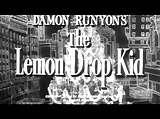
|
The Lemon Drop Kid (1951) This early 50's Paramount film starred Bob Hope as the title character:
It was most notable for Marilyn Maxwell's (as 'Brainey' Baxter, the Lemon Drop Kid's sometime girlfriend) debut singing of the enduring Yuletide hit ballad Silver Bells (pictured), with words and music by Jay Livingston and Ray Evans. Next to her, Sidney (wearing a Santa Claus outfit with a white-rimmed cap and fake beard) rang hand bells:
[Note: It was first sung moments earlier in the film by Gloomy Willie (William Frawley, better known for his role in the I Love Lucy TV show), as he was trying to collect money as a bell-ringing Santa on the street.] |
 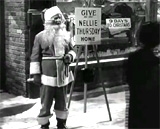
|
|||
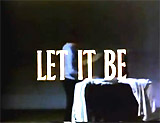
|
Let It Be (1970, UK) This biopic documentary was originally made to show the 'live' making of the Beatles' next album Let It Be in early 1969 in the studio, but became more of a chronicling of their contentious friction and impending breakup. It poignantly captured the final public appearance of the band in their archetypal live, mid-day rooftop concert performance at their Abbey Road studio with the crowd surrounding them, concluding with Get Back (pictured). The film also included their studio performance of:
|
 
|
|||

|
Let's Make Love (1960) In this backstage musical comedy film from director George Cukor that featured Marilyn Monroe, the blonde star (as aspiring actress Amanda Dell) sang and danced her penultimate song My Heart Belongs to Daddy (pictured) as the opening number in the film's off-Broadway musical production, while wearing a long purple sweater and sheer black tights. |

|
|||
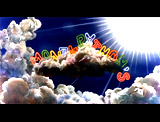 
|
(Monty Python's) Life of Brian (1979, UK) This Terry Jones-directed irreverent satire of religious films and religious intolerance featured the final crucifixion scene in which reluctant Messiah Brian (Graham Chapman) was crucified next to others and was encouraged by fellow sufferer Mr. Frisbee (Eric Idle):
Then he led the singing of the incongruously upbeat song: (Always Look on the) Bright Side of Life (pictured):
|
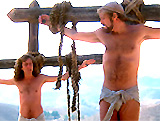 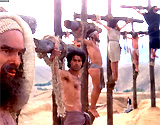
|
|||
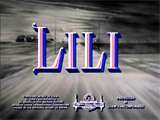
|
Lili (1953) MGM's film production of Charles Waters' romantic and enchanting fantasy-musical drama was noted for becoming the first film ever to be adapted into a Broadway musical - in 1961, named Carnival. It told about a wistful, sad, naive and lonely 16 year-old French orphan named Lili (Oscar-nominated Leslie Caron) who worked with a carnival puppet show (featuring red-haired Carrot Top and foxy and sly Reynardo) run by a sad carnival puppeteer Paul Berthalet (Mel Ferrer). She talked and sang to the puppets as if they were real people. One of the film's few songs was in the memorable and famous Hi-Lili, Hi-Lo scene (pictured), in which the catchy title song tune was sung by Lili with Carrot Top and accompanied with an accordian:
In the film's conclusion, when Lili walked out of town with her suitcase, to leave the carnival for good, she imagined that she was dancing with life-sized living versions of the four puppets - and as she danced, each one turned into Paul, backed away and returned to town. After her last dance with the fourth puppet - cowardly giant Golo, the two showered each other with kisses and embraced. Lili came to her senses and fully realized that Paul was voicing his own affection for her through the puppets, and she raced back to town and ran into Paul's arms for a passionate kiss. |
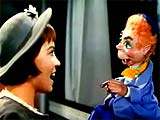 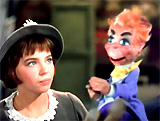 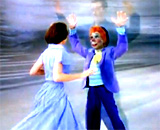 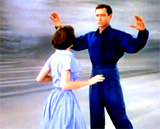 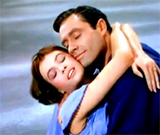
|
|||

|
The Lion King (1994)
There were many memorable songs (from Tim Rice and Elton John) and sequences in this Disney Pictures animation. Contrary to the usual pattern, The Lion King went from the screen to the stage in 1997. All of the film's four Academy Award nominations were music-related (it won two of the four), and there were three competing nominated songs (all with music by Elton John and lyrics by Tim Rice):
The most memorable songs were:
There was also:
|
 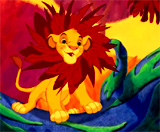 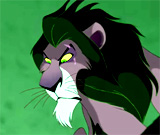 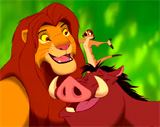 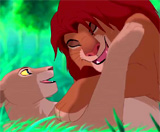 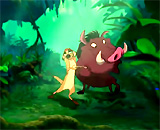
|
|||
(alphabetical by film title) Introduction | A-1 | A-2 | B-1 | B-2 | B-3 | C-1 | C-2 | D-1 | D-2 | E | F-1 | F-2 | G-1 | G-2 H-1 | H-2 | I-J | K | L-1 | L-2 | M-1 | M-2 | N-O | P-1 | P-2 | R-1 | R-2 | S-1 | S-2 | S-3 | T | U-V | W | X-Z |